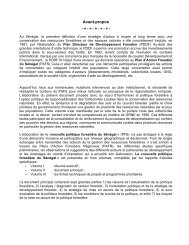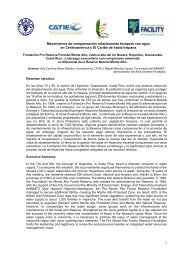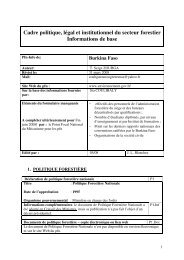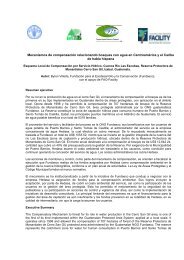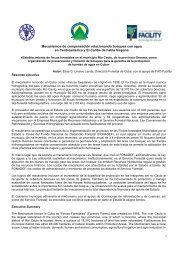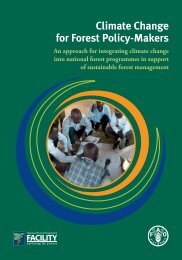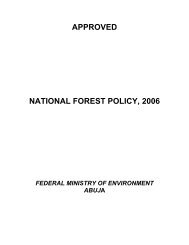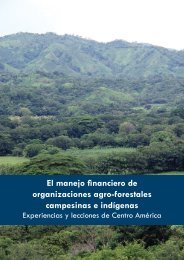2010 Progress Report â Draft - NFP Facility
2010 Progress Report â Draft - NFP Facility
2010 Progress Report â Draft - NFP Facility
You also want an ePaper? Increase the reach of your titles
YUMPU automatically turns print PDFs into web optimized ePapers that Google loves.
<strong>2010</strong> <strong>Progress</strong> <strong>Report</strong>developing countries. Groups require timely opportunities for dialogue and appropriate business developmentand financial services in support of sustainable smallholder agro-forest business activities. While smallholders indeveloping countries have established member-based organizations in the agricultural sector at local, provincialand national levels, such organizations are rarely developed in the forestry sector. The specific objective ofSFPAs is to promote the sustainable management of family, community and Indigenous forests (across contextswhere different rights prevail) and to offer products and services to the society.“Twinning” has been used to stimulate peer-to-peer cooperation amongst private sector forest producers inselected pilot-countries, including Vietnam, Ethiopia and Kenya. The Finnish and Swedish partners have madeavailable advisory services to support local twinning organizations in the implementation of the projects. Thepractical piece of the work is being carried out completely by local partners. As part of these twinningexperiences, a variety of activities are ongoing including practical forest management (seedling production,planting and harvesting); forestry business development (cooperative forest business planning and marketsurveys of different forest products) and institutional development (enhancement of forest producer cooperationand building-up of producer organizations). The pilot projects are scheduled to run through mid-2011. A furtherexpansion, <strong>2010</strong>-2013 will be planned if the initial experience is positive. More information can be found at:http://www.fao.org/forestry/enterprises/60778/en/The <strong>Facility</strong> and the Growing Forest Partnership (GFP)Growing Forest Partnerships (GFP) was initiated in 2009 with the aim of catalyzing and reinforcing effectivepartnerships. The program envisions collaboration with people directly involved with and having an impact onforests on a day-to-day basis. This type of collaborative, grassroots approach has begun to deliver realistic,practical and sustainable solutions to challenges facing forests and rural people, and has offered an alternativeto large-scale, top-down, one size fits all approaches.The <strong>Facility</strong> aims to establish sustainable stakeholder processes in countries. This objective necessitates acollaborative effort by donors and national ministries in support of nationally owned, coordinated, and drivenprocesses. For this reason, the <strong>Facility</strong> became active in the preparation of the GFP initiative, together with FAO,World Bank, IUCN and IIED. The GFP creates an opportunity to form better partnerships and coordination,based on existing nfp processes and <strong>Facility</strong> mechanisms, and to more efficiently use existing and new resourcesat the national level in <strong>Facility</strong> partner countries.The program is currently operational in five pilot countries, including Ghana, Guatemala, Liberia, Mozambiqueand Nepal. Strategies and processes look different in each country, but generally include a combination ofcapacity building, information sharing and partnership facilitation activities. The <strong>Facility</strong> has been the mainfacilitator of GFP in Guatemala and Liberia (and since the end of <strong>2010</strong>, also in Mozambique) and has thus linkedthe GFP support closely to the ongoing nfp activities, in particular to the strengthening of stakeholderrepresentation and work on forest financing.In Guatemala, the community forestry alliance (‘Alianza’) continued to develop and thrive with the support ofGFP, and due to their inputs and lobbying, a program called PINPEP was passed at the end of <strong>2010</strong> by theGuatemalan Congress to provide reforestation incentives to smallholders, with or without formal land tenure.GFP also supported capacity building and dialogue related to forest finance preparedness and policies byconvening trainings and policy discussions and supporting relevant research studies and surveys.In Liberia, the GFP has, since early <strong>2010</strong>, contributed to the establishment and operations of a National ForestForum and several County Forest Forums, ensuring broad and inclusive stakeholder participation. GFP has alsosupported an inventory of and awareness raising on the economic importance of NTFPs in Liberia.18



